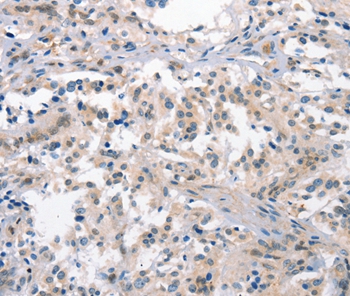
| WB | 咨询技术 | Human,Mouse,Rat |
| IF | 咨询技术 | Human,Mouse,Rat |
| IHC | 1/15-1/50 | Human,Mouse,Rat |
| ICC | 技术咨询 | Human,Mouse,Rat |
| FCM | 咨询技术 | Human,Mouse,Rat |
| Elisa | 咨询技术 | Human,Mouse,Rat |
| Aliases | CRF1; CRHR; CRF-R; CRFR1; CRF-R1; CRFR-1; CRH-R1; CRHR1L; CRHR1f; CRF-R-1; CRH-R-1; CRH-R1h |
| Entrez GeneID | 104909134;1394; |
| Host/Isotype | Rabbit IgG |
| Antibody Type | Primary antibody |
| Storage | Store at 4°C short term. Aliquot and store at -20°C long term. Avoid freeze/thaw cycles. |
| Species Reactivity | Human |
| Immunogen | Synthetic peptide corresponding to a region derived from internal residues of human corticotropin releasing hormone receptor 1 |
| Formulation | Purified antibody in PBS with 0.05% sodium azide. |
+ +
以下是3篇关于CRHR1抗体的代表性文献及其摘要概括:
1. **文献名称**: "A CRHR1 antagonist prevents synaptic loss and cognitive deficits in a mouse model of Alzheimer's disease"
**作者**: Li et al.
**摘要**: 研究证明,使用CRHR1特异性抗体拮抗剂可减少Aβ诱导的神经元突触损伤,改善阿尔茨海默病模型小鼠的认知功能,提示其通过抑制CRHR1过度激活发挥神经保护作用。
2. **文献名称**: "CRHR1 antibodies as potential therapeutic agents for stress-related disorders"
**作者**: Smith et al.
**摘要**: 该研究开发了一种靶向CRHR1胞外域的单克隆抗体,在动物模型中有效阻断CRH信号通路,显著降低焦虑样行为,为创伤后应激障碍(PTSD)提供了非激素类治疗新策略。
3. **文献名称**: "Development of a high-affinity CRHR1 antibody for in vivo imaging"
**作者**: Zhang et al.
**摘要**: 研究团队利用噬菌体展示技术筛选出高亲和力人源化CRHR1抗体,成功应用于脑部CRHR1分布的PET成像,为抑郁症等疾病的生物标志物检测提供工具。
4. **文献名称**: "CRHR1 blockade with a monoclonal antibody attenuates corticosterone responses in preclinical models"
**作者**: Jones & Williams
**摘要**: 通过单抗选择性抑制CRHR1.显著降低慢性应激动物模型的皮质酮水平,验证了其调节下丘脑-垂体-肾上腺(HPA)轴过度活性的潜力。
CRHR1 (corticotropin-releasing hormone receptor 1) is a G protein-coupled receptor that binds corticotropin-releasing hormone (CRH), a key regulator of the hypothalamic-pituitary-adrenal (HPA) axis. It mediates stress responses by stimulating adrenocorticotropic hormone (ACTH) release from the pituitary, ultimately triggering glucocorticoid production. Dysregulation of CRHR1 signaling is implicated in stress-related disorders (e.g., anxiety, depression), addiction, and inflammatory conditions.
CRHR1 antibodies are tools designed to target specific epitopes on the receptor, enabling research into its expression, localization, and function. They are used in techniques like Western blotting, immunohistochemistry, and flow cytometry to study CRHR1 distribution in tissues, particularly the brain, pituitary, and immune cells. Some antibodies act as antagonists, blocking CRH binding to modulate HPA axis activity, while others serve as agonists to activate receptor signaling. These properties make them valuable for exploring CRHR1's role in pathophysiology and testing therapeutic strategies.
Pharmaceutically, CRHR1 antagonists (e.g., verucerfont, CP-376395) have been investigated for treating depression and anxiety, though clinical trials show mixed results. Antibodies with high specificity are also developed as potential biologics to minimize off-target effects. Recent studies highlight CRHR1's involvement in neuroinflammation and metabolic disorders, expanding its therapeutic relevance. Challenges remain in ensuring blood-brain barrier penetration for CNS applications and optimizing receptor subtype selectivity over CRHR2.
×